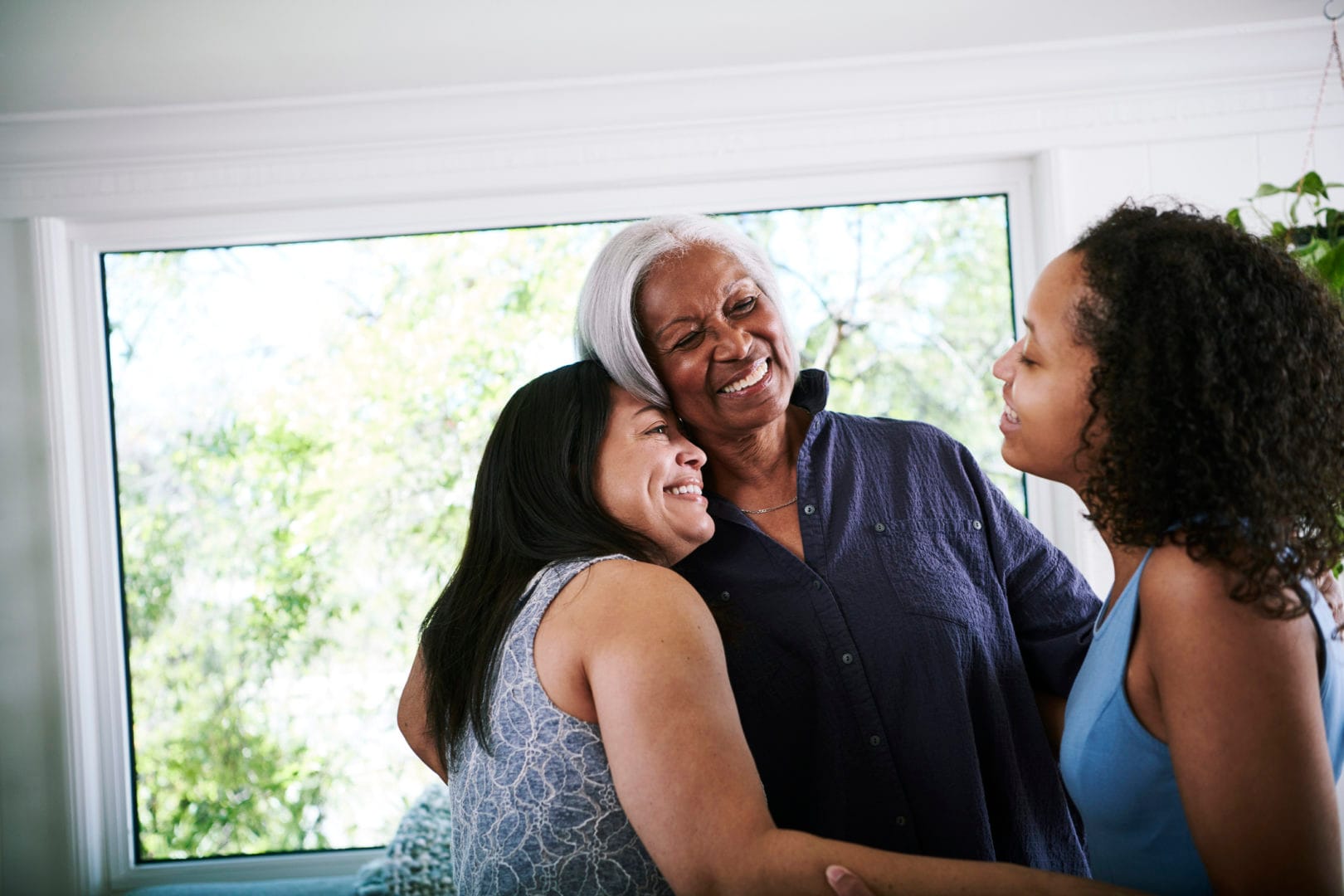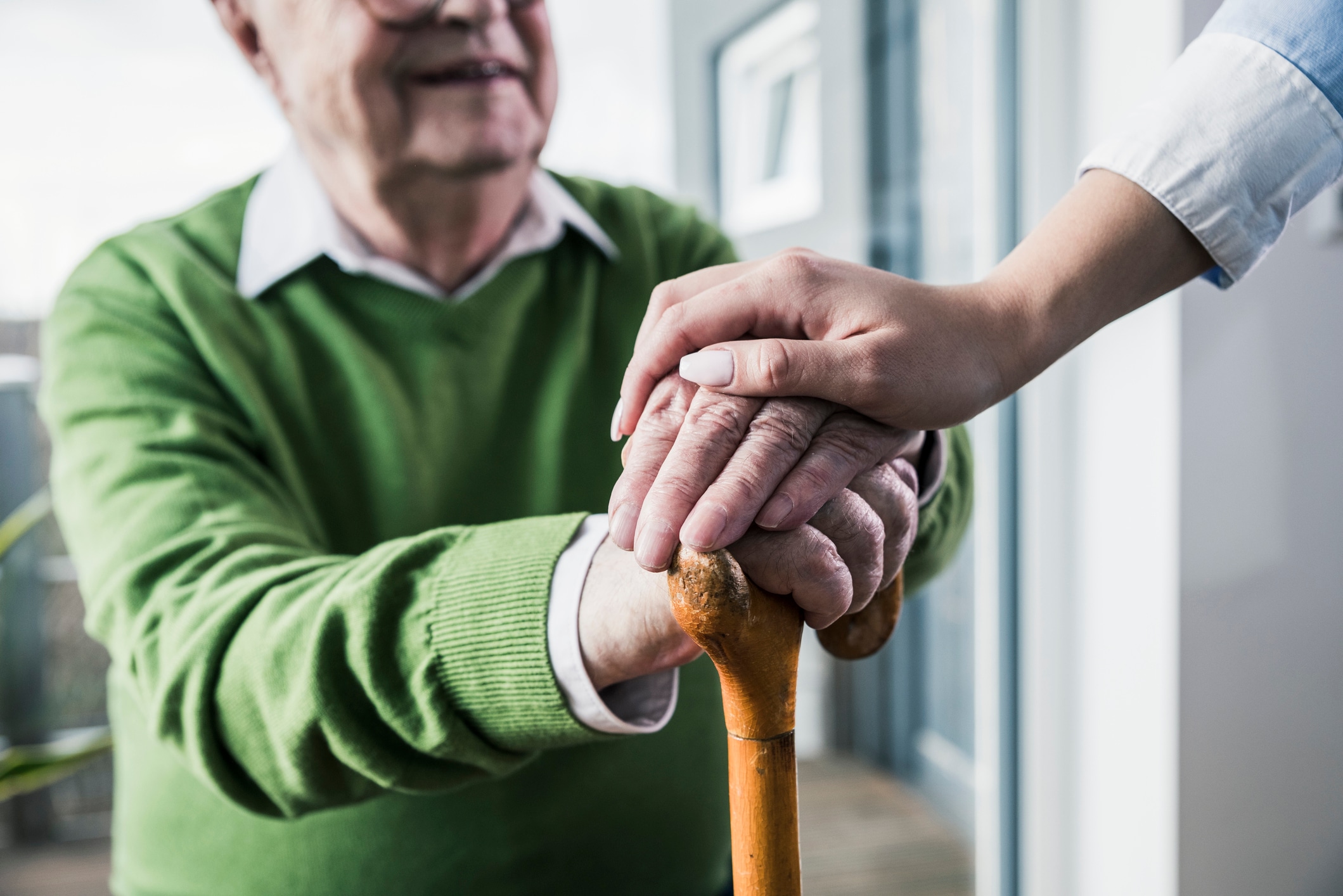Whether you’ve been planning on becoming an aging parent’s caregiver some point down the line or not, the unexpected can always happen; and when it does, it can leave you in the stressful position of wondering whether or not your parent should move in with you. In fact, according to Brian Geyser, APRN-BC, MSN, chief clinical officer at Inspīr and vice president of Clinical Innovation & Population Health for Maplewood Senior Living, when it comes to older adults, emergency caregiving situations like this aren’t rare at all.
“I personally had this situation with my mother,” he says. “One day, she was ‘healthy’; the next, she was diagnosed with metastatic colon cancer.” Geyser notes that in the months that followed, he and his siblings “became her care managers, advocates and caregivers.”
Before moving mom or dad in with you — temporarily or permanently — there are things to consider. We’ve consulted a number of senior caregiving experts to pinpoint 10 things to take into account before moving an older parent in with you and caring for them in your home.
1. All your options
First, consider why you want your aging parent to live with you, and take a look at all the possibilities.
“For many, this decision is based on cultural values or limitations in resources,” says Teri Dreher, RN, iRNPA, CCM and owner/CEO of NShore Patient Advocates. “This is a great choice for many families, but it takes more than one person to make this work. It can become an excessive burden quickly, particularly if the senior is depressed, uncooperative or a safety concern. In the best of circumstances, it is hard work for the whole family, but many find that it teaches the younger generation valuable lessons.”
Geyser highlights the following alternatives to caring for an aging parent in your home:
- Assisted living. “[This] is part of a continuum of long-term care services that provide a combination of housing, personal care services and health care designed to respond to individuals who need assistance with normal daily activities in a way that promotes maximum independence,” Geyser says.
- In-home care. Whether you hire independently or through an agency, having an extra set of hands to help with the care of mom or dad can mean the difference between moving or staying in one’s home. “Home care agencies typically employ both non-medical and medical providers ranging from home health aides and personal assistants to nursing assistants and registered nurses,” Geyser says.
- Expert help. Looking into hired help to review your family’s situation, including geriatric care managers, elder law attorneys, geriatric social workers and area agencies on aging can be helpful as you navigate your options.
2. What long-term logistics will look like
“When care needs arise, we often have a short-term focus: What can I do today, or this week to help?” says Emma Dickison, president and CEO of Home Helpers Home Care. “This is wonderful, but it doesn’t set up the most sustainable plan for mom or dad’s care. Thinking through what you can commit to and being open with your parent and [immediate family] is essential so that the plan is inclusive of everyone that can provide support, reducing stress overall.”
Dickison suggests tackling the following questions with your spouse, siblings and any other family or friends who may be involved:
In what ways are each of us prepared to help with mom’s or dad’s care?
Talk about this in terms of financial help, in-person care and back-up coverage. This will help you get a feasible plan in motion that everyone understands. Better yet, write this down and upload into a shareable online document.
What worries or fears do family members have about mom or dad moving? What can each person do to help to solve these concerns?
This is important because your mom or dad might be feeling particularly vulnerable right now. “Having a meaningful conversation about these concerns up front can help reduce the personal stress for all involved — both today and tomorrow,” says Dickison.
How will the family deal with issues that arise as a result of mom or dad living with family?
Make sure everyone is on board with you being the primary caregiver. This will help mitigate family arguments.
For the family living with mom or dad: What are your expectations about other family’s involvement in these matters?
“All too often, when a parent lives with one of the adult children’s family, concerns about how things are being managed arise from other family members,” says Dickison. “As the family hosting mom or dad, it is important to set up a process to hear and address these concerns. If you discuss how to address concerns in advance you can save the emotional and personal stress associated with family members trying to deal with the situation themselves and make sure everyone has the same understanding.”
3. The financial factors and paperwork
“Most people don’t realize the costs involved in caring for a parent,” says Geyser, who highlights that expenses can include everything from emergency response systems for your mom or dad, to home renovations for elder safety.
“Before moving them in, you’ll want to understand your parent’s financial situation and how they will contribute,” he says. “Do they have a regular income? How much? Do they have savings and assets? What kind of insurance coverage do they have? Do they have a long-term care policy and/or a final expense policy?”
“Most people don’t realize the costs involved in caring for a parent.”
BRIAN GEYSER, VICE PRESIDENT OF CLINICAL INNOVATION AND POPULATION HEALTH FOR MAPLEWOOD SENIOR LIVING
To flesh out your financial situation, Dickison suggests reviewing the following questions with immediate family:
- Is someone needing to change their employment to provide care? How will that impact their family?
- Should the family develop a plan to help offset this loss in income?
- Is it appropriate for mom or dad to pay “rent” to cover the cost of their housing, food, etc.? How will that be managed? If not, how can expenses be offset?
You should also consider advice from Danielle Kunkle Roberts, founding partner at Boomer Benefits: Sit down with an elder law attorney to complete important paperwork, including having mom or dad appoint you or another trusted loved one as power of attorney, so you have the right documents in place should something happen.
“You are likely going to be involved in conversations with their Medicare insurance broker, and if you don’t have the right power of attorney documents on file, Medicare won’t talk to you,” Roberts says.
4. Whether insurance benefits will help with costs
Financial aid or any other benefits you may get for being the primary caregiver to your parent depends on the state you live in and how your parent’s benefits work. Be sure to investigate with Medicaid and/or Medicare, as well as any Veterans Aid, if applicable.
Christopher Ciano, president of Aetna Medicare says that in 2019, the Centers for Medicare & Medicaid Services (CMS) “expanded the definition of ‘health-related benefits’ to include in-home support services such as portable wheelchair ramps and bathroom grab bars — meaning that certain Medicare Advantage plans may be able to provide support to make the home more accessible.”
5. Whether your home needs modifications
When assessing your home for the care of your elderly parent, Geyser stresses the importance of asking these questions:
- Does the bathroom have the necessary safety and mobility equipment?
- Are there elevated thresholds between rooms, which could pose a fall hazard?
- Do you need to declutter? Clutter also presents a fall hazard. According to the CDC, each year about 36 million falls are reported among older adults, and about three million require medical care for fall-related injuries.
- Is there adequate lighting?
- Is the house wheelchair/walker accessible?
- How will they get out in the event of an emergency?
6. Which routines and house rules will be in place
Be sure to talk about personal space boundaries and any other house rules before mom or dad move in — and then include them in the conversation.
“We all have preferences for how we like to live,” says Dickison. “They may be as simple as how much alone time someone needs or habits we have. Talking about these in advance can ensure that [the arrangement] is a good fit for mom or dad and the family.”
7. What your daily schedule will look like
“Caregiving takes a lot of time out of your life; however, you still have life and personal obligations,” says Keandra Ward, of Tampa, Florida, the primary caregiver to her mother.
Ward’s go-to tool for managing her time is adhering to a daily schedule.
“Caregiving takes a lot of time out of your life; however, you still have life and personal obligations.”
KEANDRA WARD, CAREGIVER
“People wonder how I get so much done in a day; it’s truly because I run my life by my schedule,” she says. “If the day doesn’t go exactly as I planned it, I choose to not fight or get stressed. As long as the basic daily needs such as meals and bathing are met, I’m satisfied.”
8. What mom or dad’s social life will look like
“Educate yourself about programs for your parents to stay involved with people their age, so they aren’t dependent on you for their social life,” says Andrea Smith, executive director and CEO of Senior Action. “Friends are just as important to your health as medicine.”
If you’re looking for cost-effective ways to promote their social life, a look through your parent’s Medicare plan is a worthwhile move.
“At Aetna, many of our Medicare Advantage plans offer benefits like SilverSneakers, which gives members access to over 15,000 fitness locations across the country and group fitness classes,” says Ciano. “Aetna Medicare Advantage plans also offer access to our Resources for Living program, where consultants help connect your loved one with local groups or activities specific to their interests.”
9. How you’ll take the best care of yourself, as well
Caring for elderly parents can be a challenge, but the more prepared you are, the smoother your transition will be. Remember to take deep breaths, and “put your oxygen mask on first,” Smith says, adding, “You will be a better caregiver and helper if you are a healthy person.”
If you do decide to move mom or dad in with you, you might want to consider a week-long trial run, as Cheryl Clark, director of Philadelphia Corporation for Aging’s (PCA) Caregiver Support Program recommends. From there, “be sure to give enough time to adjust,” says Clark. “Six months to a year may be needed to get a real sense of how things will work out.”





